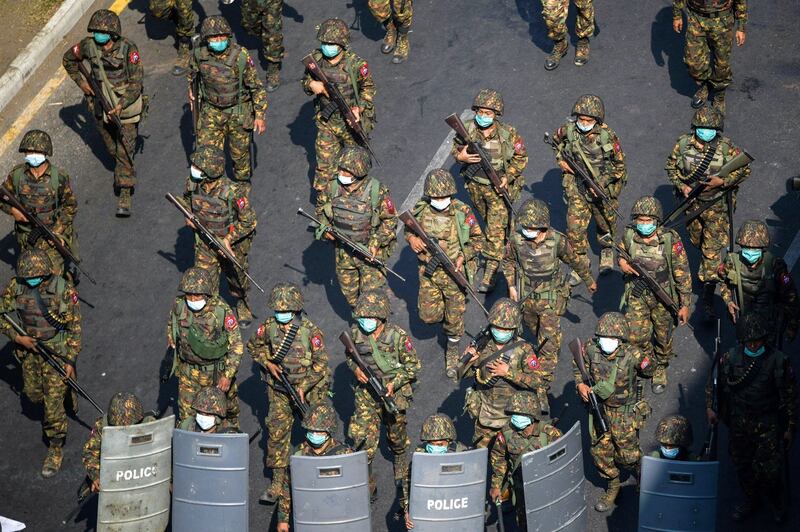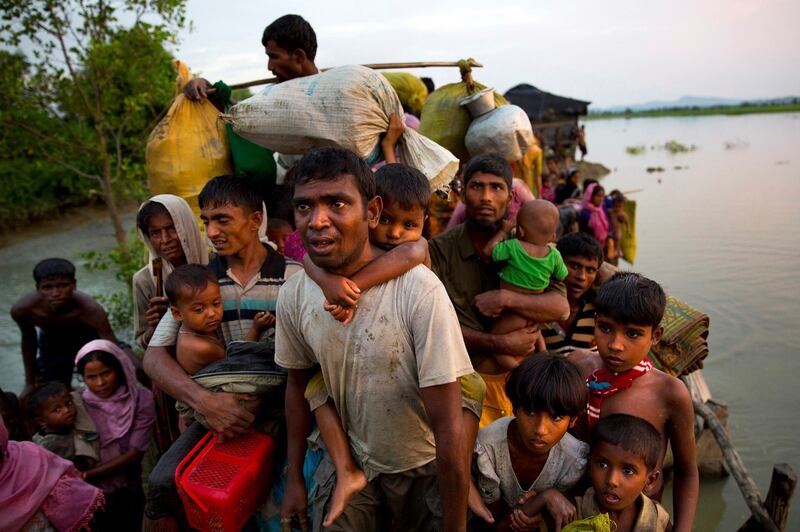On 21 March 2022, U.S. Secretary of State Anthony Blinken made a formal determination that Myanmar's military committed genocide against the Rohingya population in 2017. He described the attacks as "widespread and systematic", "with a clear and premeditated intention to destroy the Rohingya population." This went beyond the U.S. government's previous findings that the military had committed ethnic cleansing in the process of driving over 740,000 Rohingya across the border into neighboring Bangladesh.
The determination comes five years after the fact, in a case that was broadcast in real time, and documented by human rights observers who were able to use commercial satellite imagery to prove that entire villages had been razed. Interviews of refugee women found so much rape and gang rape that it could only have been official government policy.
The determination has no immediate legal impact on Myanmar’s military, which in February 2021 staged a coup d’état and ousted the democratically elected government that a few months before had shielded the military, defending its actions before the International Court of Justice.
But the designation does have other important policy ramifications.
Does it obligate the United States to do anything ?
In a legal sense, the designation is nothing more than symbolic, which begs the question why it could not have been made sooner. It does not commit the United States to do anything, including increasing aid and support for third country resettlement of the Rohingya refugees in Bangladesh.
The United States will provide the original ICJ plaintiff, The Gambia, an additional $1 million to continue their lawsuit. More importantly, it will provide The Gambia with the documents and evidence that it used to make the determination, which could be important if they then move to refer the case to the International Criminal Court.
The designation comes just over a year into the Biden administration, which wants to draw a clear distinction from its predecessor and reinforce the government’s commitment to human rights and democratic values.
Myanmar’s military junta has been in power now for almost 14 months. In that period, they have killed over 1,700 people and arrested 13,000. The army has waged an all-out war against its population, razing thousands of homes.
As Blinken noted: “Since the coup, we have seen the Burmese military use many of the same tactics. Only now the military is targeting anyone in Burma it sees as opposing or undermining its repressive rule.”
Coming on the heels of Russia’s illegal invasion of Ukraine, the genocide declaration signals a change in the U.S. resolve to stand up to aggressive authoritarian regimes. Not imposing costs early on only emboldens further aggression.
The Tatmadaw got away with genocide in 2017 with nothing more than diplomatic opprobrium, which emboldened it to stage the coup d’état in February 2021. Likewise, the Russian invasion of Crimea in the Donbas in 2014 went unanswered, and emboldened President Vladimir Putin to invade Ukraine in 2022.

Myanmar soldiers walk down a street during a protest against the military coup in Yangon, Feb. 28, 2021. (Reuters)
What does it mean for the Rohingya?
For the Rohingya, it is a validation, and an important acknowledgement of the wrongs committed against them. It will increase expectations that perpetrators will eventually be held accountable. This has to be a real morale boost for the beleaguered population.
The designation doesn’t have any immediate impact on the more than 900,000 refugees living in Bangladesh. But it does pave a way for them to assert their rights to return home when conditions allow them to return with safety and legal protections.
Obviously the ruling matters for Bangladesh, which seeks the soonest possible repatriation of the refugees.
Will it influence the international community?
The designation could help usher in a necessary new wave of sanctions on Myanmar’s junta. While U.S. sanctions against Naypyidaw thus far have been more encompassing than anyone else’s, they have not put sufficient pressure on the military. A new round of sanctions could target the banking system, more cronies of the military leadership, and the Ministry of Oil and Gas Enterprise.
Notably, Blinken referenced an arms ban twice in his speech, though it is unlikely that China or Russia would allow the U.N. Security Council to impose one. Perhaps, it will help galvanize support for a ban on jet fuel.
The designation is perhaps an opportunity to pull Japan, Australia, Singapore, and South Korea –all of whom who were quick to sanction Russia, but have resisted sanctioning Myanmar – on board. It also creates a moral imperative for corporations to cut their business ties to Myanmar, in general, and with military-backed corporations, in particular. Shareholders may turn a blind eye to a forcible change in government; genocide is a whole other matter.
The designation is also an important gesture to Indonesia and Malaysia, who both led ASEAN’s condemnation of the junta and took in substantial numbers of refugees. The plight of the Rohingya is an issue the public in both countries cares about.
Both Jakarta and Putrajaya continue to condemn the junta's failure to implement the Five Point Consensus, ASEAN's road map for restoring democracy in Myanmar. The genocide designation gives them and other like-minded states another tool to prevent Cambodia from using its position as the group's chair to fully embrace the junta.

Fleeing persecution in Myanmar, Rohingya Muslims carry their young children and belongings after crossing the border from Myanmar into Bangladesh, Nov. 1, 2017. [AP]
What does it mean for Myanmar?
The designation does have some impact on the worsening quagmire in Myanmar.
First, it’s important to note the difference in positions on the U.S. designation: one by a responsible stakeholder, the other by a pariah.
The opposition National Unity Government welcomed the designation and reiterated its policy on the Rohingya, committing itself to “the safe, voluntary, dignified, and sustainable return of the Rohingya refugees and internally displaced persons, and to comprehensive legislative and policy reform in support of citizenship, equality in rights and opportunity, and justice and reparations.”
This reinforces the NUG's commitment to establishing a federal democracy and further legitimizes them. The NUG had previously dropped its objection to the ICJ case moving forward and pledged cooperation with the court.
Unsurprisingly, the junta’s statement was dismissive, a blanket denial of “any genocidal actions” that accused the United States of interfering in the “internal affairs of a sovereign state.” They remain impervious to international criticism.
But does it have any bearing in terms of an off-ramp for the conflict?
On the one hand, it will convince Min Aung Hlaing and the other junta leaders that they need to prevail to escape accountability. Things just got more existential for them and they are likely to escalate the violence.
More importantly, they will message this through the ranks, in order to stave off more defections from their depleting forces: we hang together, or we hang separately.
On the other hand, it could convince more officers to cut their losses and defect. The costs of being tied to a regime that is committing atrocities against an unarmed civilian population, while decimating the economy, is already causing plummeting morale and defections. The U.S. determination could help in that calculus. If the officers are looking for yet one more reason to sever ties to the senior military leadership, this could be it, even if they themselves willingly participated in and supported the operation against the Rohingya.
Zachary Abuza is a professor at the National War College in Washington and an adjunct at Georgetown University. The views expressed here are his own and do not reflect the position of the U.S. Department of Defense, the National War College, Georgetown University or BenarNews.
